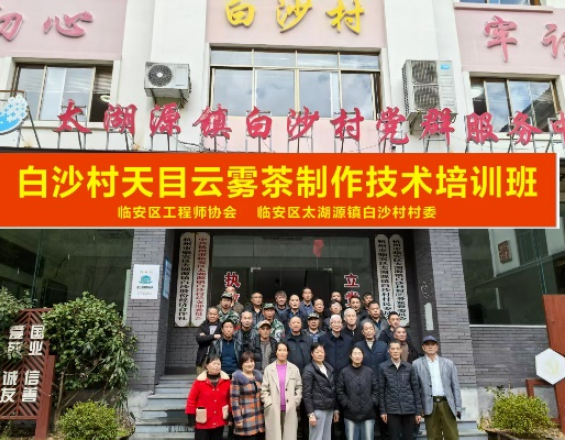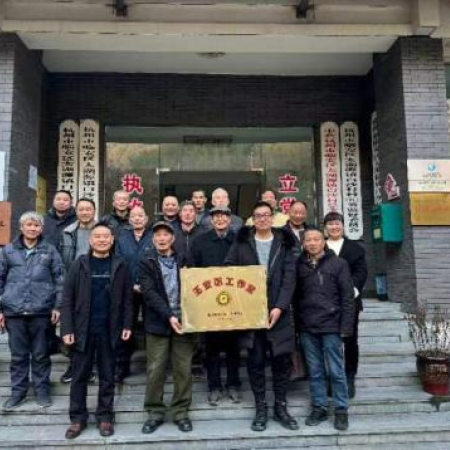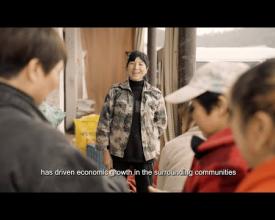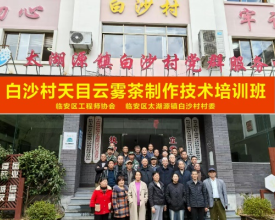
Improving sustainable agricultural development through research in Baisha Village, China

Baisha Village, in Taihuyuan Township, Lin’an District, Zhejiang Province, began forest landscape restoration (FLR) in the 1980s after severe ecological degradation caused by excessive logging. Early technical support focused on native tree species research, leading to breakthrough techniques in bamboo shoots and hickory nut cultivation. These innovations enabled the village’s transition from timber production to sustainable non-timber forest products (NTFPs), laying the foundation for Lin’an’s broader success. In 1999, Lin’an joined the International Model Forest Network (IMFN), and the Engineers’ Association was established to provide long-term technical assistance. With continuous support, Baisha’s forest coverage has rebounded to 90% in 2024 from 60.4% in 1985. In 2023, the Engineers’ Association deepened its partnership with the village by establishing the Wang Anguo Studio to tackle technical bottlenecks and enhance agricultural practices, further driving ecological restoration and socio-economic development.
Contexto
Défis à relever
Technological bottlenecks: Solving specific technical challenges faced by farmers, improving production efficiency through research and innovation.
Ecological protection: Enhancing environmental monitoring and promoting sustainable farming practices to preserve and improve the village’s ecological integrity.
Talent development: Creating interest among a younger generation to cultivate local talent and raise scientific awareness within the community.
Knowledge dissemination: Spreading successful experiences and knowledge about technology-supported agriculture to elevate the national agroforestry sector.
Ubicación
Procesar
Summary of the process
Since its establishment, the Engineers’ Association has progressively improved both the ecological environment and economic development of Baisha Village through scientific research and technical support across various fields. The Association has addressed specific technical challenges faced by farmers by promoting early emergence technology for bamboo, the use of organic fertilisers, mixed planting techniques for hickory and Huang Jing (known as Solomon’s Seal in English, widely used in traditional Chinese medicine), and tea cultivation. Regular offline lectures and training sessions are organised to provide technical support to the Community Agricultural Products Partnership Network. Furthermore, the Association places significant emphasis on knowledge transfer and talent development, creating a model that pairs older, middle-aged, and younger generations. It also runs the Junior Engineer Program in primary and secondary schools to raise scientific awareness, helping farmers throughout the region and cultivating a large number of technical talents that benefit the national agroforestry industry.
Building Blocks
Research on native species, technical development and standard promotion
The Engineers’ Association prioritises research on native species, leading to breakthroughs in early emergence techniques for bamboo shoots, organic fertiliser production, and mixed planting of hickory and native herbs. These advancements not only address farmers’ technical challenges but also enhance biodiversity and ecosystem resilience. The Association has also contributed to the formulation of forest resource management standards for Lin’an District, ensuring scientific guidance for agroforestry development is rooted in local ecological conditions.
Enabling factors
- The Association integrates experts from various fields to research native species and develop agroforestry techniques that balance conservation and economic growth
- Collaboration with local government, research institutions, and experienced farmers facilitates the development and implementation of scientific standards for local forestry products such as the bamboo shoots, hickory nuts, and other flagship products
Lesson learned
- Cross-sectoral collaboration is essential for advancing agroforestry technologies and promoting standardised, research-based approaches to native species conservation and sustainable use
Talent cultivation and inheritance
The Engineers’ Association has established a generational mentoring model, including the Junior Engineer Program, to enhance regional scientific and technological awareness and ensure the long-term sustainability of agroforestry knowledge.
Enabling factors
- For over 26 years of experience, the Association has trained numerous technical experts and developed a successful talent cultivation model in Baisha Village and beyond.
- Collaboration with universities and research institutions has strengthened knowledge exchange and capacity building.
- The Junior Engineer Program, launched in local schools, fosters early awareness of sustainable forestry, ensuring future generations are equipped with the necessary skills and knowledge.
Lesson learned
- Human resources are key to the long-term sustainability of agroforestry development.
Organizing field training and exchange activities
Regular training and exchange activities promote successful experiences in scientific assistance for farmers and raise the country's agroforestry technology levels.
Enabling factors
- Supporting farmers enables the provision of effective, timely training in Baisha Village
- Strong collaboration between the Association and local government ensures the alignment of training with both ecological and economic goals
- Connecting scientific expertise to specific agroforestry needs has helped facilitate practical solutions for local farmers
Lesson learned
- Regular exchange activities are key to strengthening the overall agroforestry technology landscape and enhancing capacity at the community level.
Impacts
- Economic Benefits:
Increased livelihood options and higher incomes for villagers through cost-reduction and efficiency-enhancing technologies
Boosted development of agro-tourism, including the promotion of mixed planting techniques and eco-tourism, creating a diversified economy for the village
Environmental Benefits:
Forest ecosystem improvement through afforestation and sustainable land-use practices, with a 97% forest coverage, stabilised ecosystem and less soil erosion
Eco-tourism bringing nature education opportunities for tourists and local people- Social Benefits:
Cross-generational training programs and the Junior Engineer Program have created a strong sense of mutual support and cooperation within the community
Baisha’s success has attracted national and international attention, serving as a model for sustainable development, with the Engineers' Association promoting the "Lin'an model" globally through seminars and workshops
Beneficiaries
Local Farmers: Increased income, improved quality of life, and a mastery of new technologies.
Young students: Increased awareness of sustainable forestry and agroforestry practices.
Small and Medium-sized Enterprises (SMEs): expanded and sustainable market.
Global Biodiversity Framework (GBF)
Sustainable Development Goals
Story

Wang Anguo, a respected forestry technology expert, has spent decades advancing sustainable forestry practices in China. Wang Anguo played a pivotal role in the growth of Baisha Village, which has become a model for rural revitalisation. He is credited with driving initiatives such as the cultivation of high-yield bamboo shoots and hickory nuts, fostering agritourism, and introducing innovative forest management techniques. His research helped Baisha create industries like tea production and agro-tourism, generating significant economic benefits.
On December 27, 2023, the Lin’an Engineers Association signed a cooperation agreement with Baisha Village to establish "Wang Anguo’s Studio, named in honour of his contribution to the village. This collaboration marked the beginning of the targeted technological assistance to agriculture, bringing together experts from diverse fields, with Wang Anguo as the honorary director.
Baisha Village, known for its growing agritourism sector, had faced challenges in developing its agroforestry and tourism industries due to lacking technical expertise. While the village's agritourism and homestay businesses were flourishing, agricultural production methods were outdated, and environmental issues, including wastewater management and pest control, had not been effectively addressed.
In response, the Association provided targeted guidance, focusing on upgrading farming techniques. Additionally, they introduced innovative ideas for expanding the village’s forest wellness tourism industry, offering residents a chance to benefit from a growing eco-tourism market. The collaboration also emphasised environmental protection, guiding Baisha Village in sewage treatment and scientific pest control methods. These combined efforts boosted the village’s sustainable development and living standards. This partnership is a model of rural revitalisation and exemplifies the power of collaboration between local communities and expert organisations.
This story has been produced with financial support from the Government of Canada’s Global Forest Leadership Program and through the International Model Forest Network (IMFN) Secretariat's IMFN Climate initiative which supports efforts to scale up forest and landscape restoration, enable inclusive landscape governance, and equip the next generation of forest leaders to address the twin crises of climate change and biodiversity loss.









